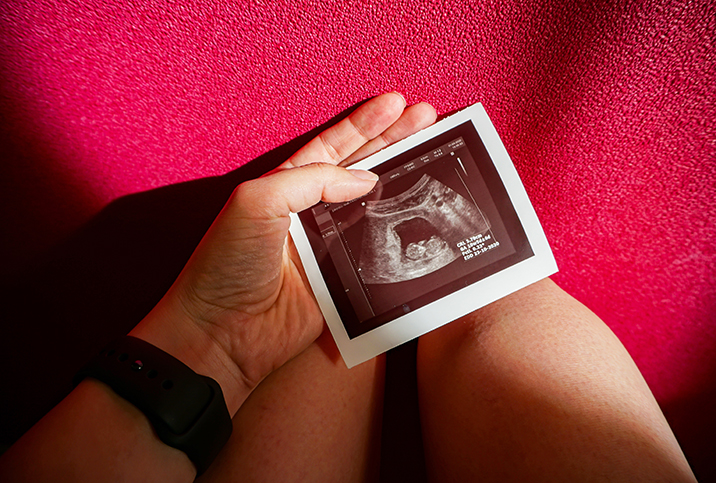Miscarriages Are Very Common—Are They Preventable?

A miscarriage, or early pregnancy loss, is also called spontaneous abortion by medical providers. A miscarriage is a loss of a pregnancy, fetus or embryo before the 20th week. After the 20th week of pregnancy, a loss is called a stillbirth.
Most miscarriages happen before the 12th week of pregnancy. An estimated 80 percent of miscarriages occur in the first trimester of pregnancy, according to the American College of Obstetricians and Gynecologists (ACOG), and only about 2 percent to 3 percent of people lose their pregnancies in the second trimester.
After 12 weeks, the risk of a miscarriage decreases. Although miscarriages can be physically and emotionally challenging, most people who have experienced a miscarriage can go on to have successful pregnancies in the future.
Miscarriages are extremely common, explained Beth Zhou, M.D., a reproductive endocrinologist and board-certified OB-GYN at CCRM Fertility in Houston.
"About 10 to 20 percent of clinically recognized pregnancies lead to a miscarriage, but the actual frequency of miscarriages is much higher since most miscarriages occur before females even know they're pregnant," Zhou explained.
Many miscarriages—around half—occur when an embryo does not develop properly. A variety of factors could cause a miscarriage, and it can be difficult to pinpoint an exact cause. You cannot prevent a miscarriage from occurring.
Physical and emotional symptoms from a miscarriage can be different for each individual.
"Signs of a miscarriage are severe cramping and vaginal bleeding. There may be passage of large blood clots and tissue," Zhou said. Sometimes a lower backache is present. However, some people experience no symptoms at all, Zhou added.
To confirm a miscarriage at a doctor's office, an ultrasound can be performed to see that the pregnancy sac is no longer present or the fetus has not grown or does not have a heartbeat, Zhou said.
Types of miscarriage
Depending on how far along someone is in their pregnancy, a miscarriage can last a few days to weeks. There are several different types of miscarriages: threatened, inevitable, missed, complete and incomplete. Various signs accompany each type of miscarriage.
"A threatened miscarriage is when the female starts to experience symptoms concerning a miscarriage, such as cramping or bleeding," Zhou explained. "[However,] experiencing these symptoms does not mean that a miscarriage is for sure."
Threatened miscarriages can occur with or without vaginal bleeding, and the cervix is closed. Sometimes a threatened miscarriage can result in a normal pregnancy, but it increases the risk of pregnancy loss and also can result in an inevitable miscarriage. For a threatened miscarriage, the recommended course of action is usually to rest, monitor and wait.
An inevitable miscarriage occurs when there are symptoms of a miscarriage and the cervix begins to open for the pregnancy to pass, Zhou said. There is increased bleeding and no chance of continuing the pregnancy.
"A missed miscarriage is a type of miscarriage where the mom has no symptoms, but the miscarriage is diagnosed on ultrasound when the fetus has not grown or has no heartbeat," Zhou said. The pregnancy tissue typically passes on its own during a missed miscarriage.
A complete miscarriage occurs when the whole pregnancy is expelled from the uterus, Zhou explained. When someone experiences a complete miscarriage, they usually do not require further treatment.
"An incomplete miscarriage is when most of the pregnancy has passed but there is still pregnancy tissue remaining in the uterus. This may pass on its own with time or need a surgical procedure," Zhou said.
No treatment can stop a miscarriage. Treatment types for miscarriage include expectant management or letting it progress naturally. While expectant management can be a successful treatment method for 80 percent of women, some may opt for other treatments as expectant management can be physically and emotionally taxing.
Another option for miscarriage management is medical treatment, which involves taking medication that can help the body expel pregnancy tissue faster. For the majority of people, medical treatment works within 24 hours.
The last option for miscarriage management is surgery, a minor procedure called dilation and curettage (D&C). During a D&C, a healthcare provider dilates the cervix and removes any pregnancy tissue. If a miscarriage causes heavy bleeding or someone shows any sign of an infection, surgery may be recommended. Rarely, septic miscarriages occur when there is an infection in the uterus and it requires immediate medical care.
For people who have experienced multiple miscarriages, an appointment with a doctor can be helpful to provide testing that can identify any conditions, hormonal imbalances or potential underlying causes. About 1 in 100 people have repeat miscarriages or more than two miscarriages in a row.
After a miscarriage
Many people can go on to have healthy pregnancies after a miscarriage. Usually, to prevent infection, sex is not recommended for two weeks after a pregnancy loss. However, it's possible to ovulate and become pregnant two weeks after a miscarriage.
It's common to experience a range of emotions, such as grief, shock, depression and anxiety. After an early pregnancy loss, around 20 percent of people screen positive for anxiety or depression. Receiving treatment through social support, such as attending an early pregnancy loss group, practicing self-care and seeing a counselor, can help with the often complex and isolating experience of a miscarriage.
"It is important to stress that a miscarriage is never someone's fault, even though it is normal to feel guilt," Zhou said.
Even though the word "miscarry" implies that someone did something wrong, the most common cause of a miscarriage is a chromosomal abnormality in the embryo, which cannot be prevented or controlled in any way.
"It is also normal to feel immense sadness when experiencing a miscarriage. Plenty of studies show that females who experience a miscarriage can have residual symptoms of PTSD and depression for several months after their loss," Zhou explained.
Despite how common miscarriages are, pregnancy loss is often not discussed enough.
"Women must feel empowered and validated to seek help, emotionally and physically, for their miscarriage," Zhou said.


















